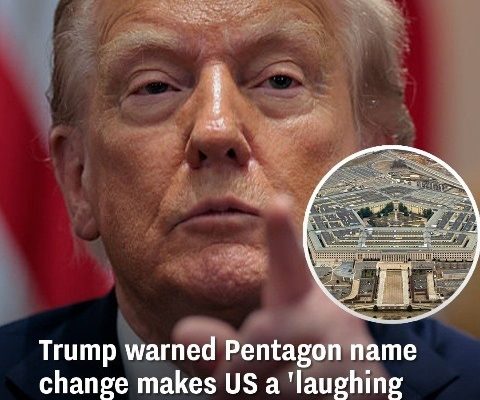Trump to Rebrand Pentagon as “Department of War”
In a move that has already sparked intense debate, Donald Trump is set to sign an executive order today, September 5, that would rebrand the Pentagon for the first time in decades. The order replaces the familiar Department of Defense (DOD) title with a revived label not used since 1947: Department of War.
The Order and Its Rationale
According to documents obtained by the BBC, the new title will initially serve as a secondary designation, promoted as a bolder statement of “readiness and resolve” compared to “Defense.”
Trump’s directive assigns Defense Secretary Pete Hegseth the task of drafting steps to formalize the change. Speaking to Fox News, Hegseth defended the decision:
Hegseth argued that the rebrand reflects a “warrior ethos,” designed to project lethality and deterrence against enemies.
Supporters: Strength in Symbolism
Within Trump’s circle, the change is celebrated as a symbolic restoration of America’s military confidence. Supporters frame the name “War” as a message of strength in a turbulent global climate, signaling that the U.S. is unafraid to confront adversaries directly.
Trump himself has long praised the old War Department, describing it as part of America’s “unbelievable history of victory” and criticizing the current name as “weak” by comparison.
Critics: A Dangerous Shift in Tone
Public reaction has been swift and largely negative. Social media users called the move “stupid,” “wasteful,” and “embarrassing.” Diplomats and analysts warn that reviving the “War” title risks sending an aggressive signal abroad, undermining alliances and stoking tensions.
For decades, the Department of Defense has symbolized a posture of strategic restraint. To many, shifting back to “War” reflects not policy substance but a rhetorical escalation — one that could make America appear more confrontational at a time when global relations are already fragile.
Beyond Politics: The Power of Words
History shows that names carry weight. To rename an institution is to redefine its spirit, reshaping how it sees itself and how the world perceives it. A word like “war” may rally some, but it also sharpens edges, narrowing space for diplomacy and cooperation.
The Qur’an reminds us: “And speak to people good words.” (2:83) — a reminder that language is not neutral; it shapes reality. Leaders who elevate the vocabulary of conflict risk normalizing it, while those who choose the language of restraint may sow paths for peace.
As this executive order unfolds, the debate is not merely about bureaucratic rebranding but about the soul of America’s global posture: Will it define itself by defense, or by war?



